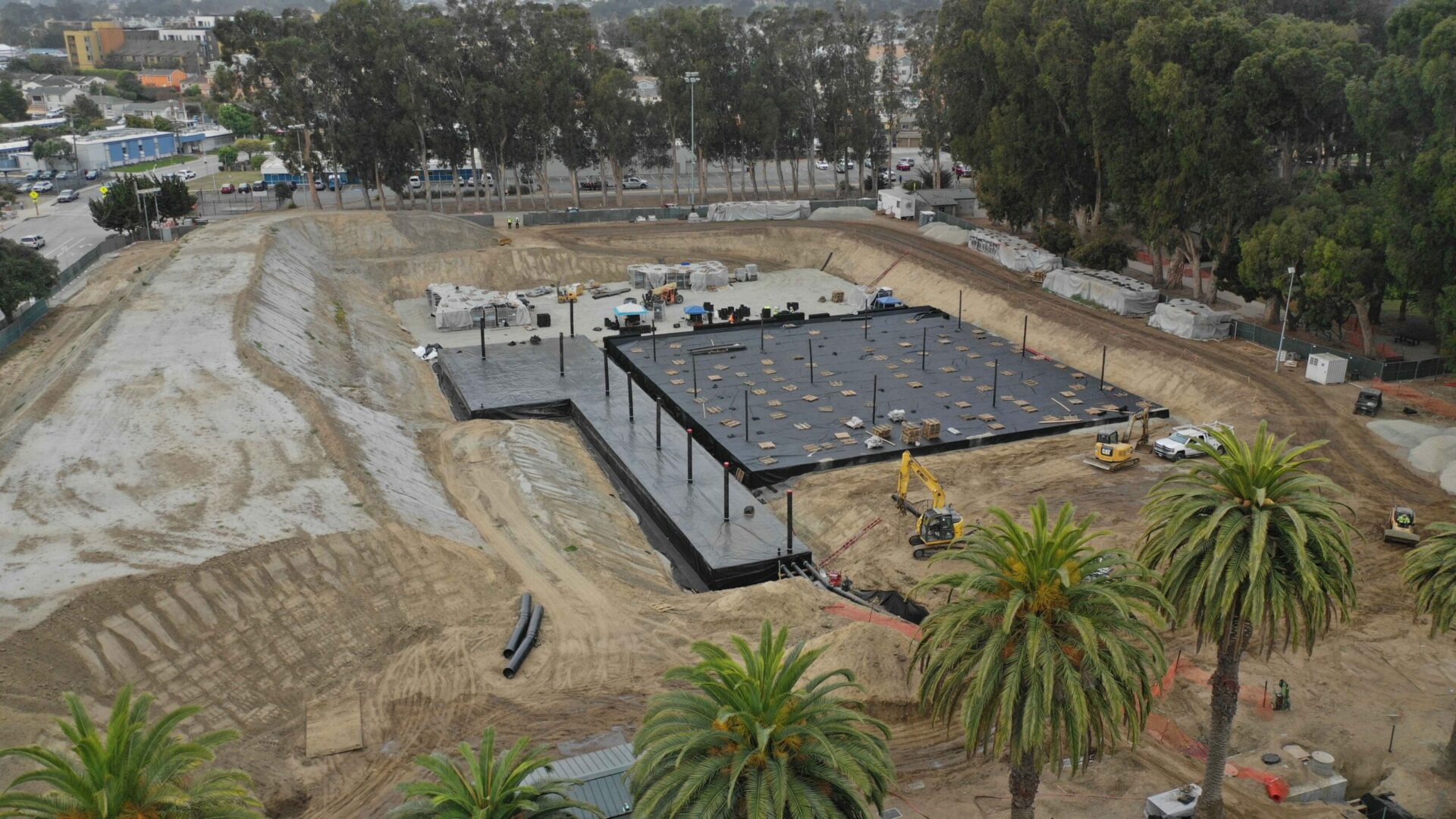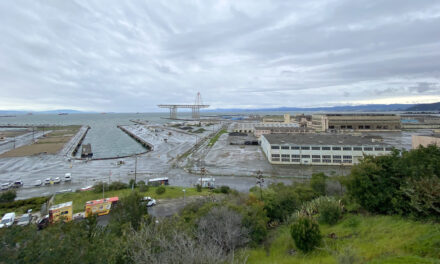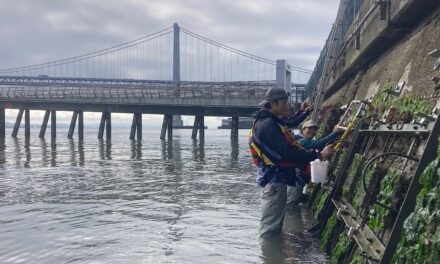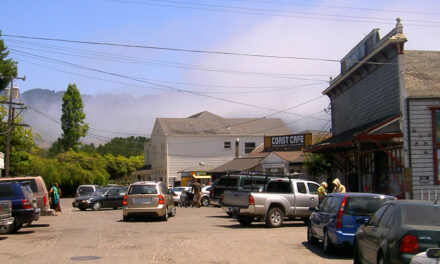Regional Storm Capture Facility Going to Ground
With rains overwhelming local drains in late October, the visible construction progress over the summer on Orange Memorial Park, a regional stormwater capture facility in South San Francisco, seems timely.
More than 6,500 acres of the Colma Creek watershed, in six municipalities, drain through the new regional facility. The facility, scheduled for completion in 2022, includes trash screens, a sediment removal chamber, and a giant storage basin under sports fields. It is designed to filter pollutants in runoff, percolate groundwater, and irrigate local parks and trailsides (offsetting potable water demand).
Former San Mateo County stormwater director Matt Fabry calls it “An ambitious multi-benefit project with water quality and resilience benefits.”
Areas sensitive to erosion on the half-constructed park weathered the recent atmospheric rain event under tarps and behind silt fences.
Current construction activities for the complex stormwater capture project are focused on excavation of a large subsurface drainage system. Crews recently installed modules for a 1.4 million gallon-below-ground cistern and infiltration gallery, and are working to connect pipework, maintenance ports and manholes. Installation of the modules will continue into November, followed by back filling of the entire system.

Two parts of the project located within Colma Creek, including a trash and sediment capture system (aka grit filter), required permits from the Peninsula’s fledgling Sea Level Rise and Resiliency District, US Fish and Wildlife, and the Regional Water Quality Control Board. Work in the creek also required completion before October 1 to avoid disturbing birds nesting in the riparian zone. Surface restoration will be a next step.
“We had to switch regulatory gears mid-permitting from the county flood district to the new sea level rise and resiliency district,” says project manager Bianca Liu, from the City of San Francisco. “There’s a lot of eyes on us because this the first regional scale stormwater capture and green infrastructure project, and it sets a precedent for the future.”
Project costs are $15.5 million, bankrolled by Caltrans and local jurisdictions to fulfill stormwater management mandates and mitigate for trash, PCBs, and other polluted runoff to the Bay. The project also optimizes water use and groundwater recharge in times of drought.
“When the capture basin is full, we’ll be putting the excess, clean water rather than dirty water, back into the creek,” says Liu.
The project is one of a variety of multi-partner initiatives to improve water quality and flood capacity along Colma Creek, including projects still in proposal stages inspired by the 2018 Resilient by Design Bay Area Challenge vision for the Colma Creek Watershed.
With Orange Memorial Park under construction, meanwhile, the debate over how to optimize infrastructure investments far into the future now has one tangible new example.
“This wasn’t your typical infrastructure project, the regional scale created a lot of challenges in permitting, funding and interjurisdictional decision-making. Our next challenge will be how to collaborate on O&M,” says Liu, referring to operations and maintenance responsibilities and budgets that no municipality wants to shoulder alone.
Keeping the new park and its complex underground hardware working far into the future won’t be cheap. But kids will be able to kick and bat balls on sports fields on top of the stormwater basin by 2023.
Other Recent Posts
Slow Progress on Shade For California’s Hottest Desert Towns
Coachella Valley communities face record temperatures with little shade. Policy changes lag as local groups push for heat equity.
In Uncertain Times, the Port of Oakland Goes Electric
A $322M grant powers Oakland’s port electrification — cleaning air, cutting emissions, and investing in community justice.
Testing Adaptation Limits: Mariposa Trails, Marin Roads & San Francisco Greenspace
In KneeDeep’s new column, The Practice, we daylight how designers, engineers and planners are helping communities adapt to a changing climate.
ReaderBoard
Once a month we share reader announcements: jobs, events, reports, and more.
Boxes of Mud Could Tell a Hopeful Sediment Story
Scientists are testing whether dredged sediment placed in nearby shallows can help our wetlands keep pace with rising seas. Tiny tracers may reveal the answer.
“I Invite Everyone To Be a Scientist”
Plant tissue culture can help endangered species adapt to climate change. Amateur plant biologist Jasmine Neal’s community lab could make this tech more accessible.
How To Explain Extreme Weather Without the Fear Factor
Fear-based messaging about extreme weather can backfire. Here are some simple metaphors to explain climate change.
Live Near a Tiny Library? Join Our Citizen Marketing Campaign
KneeDeep asks readers to place paper zines in tiny street libraries to help us reach new folks.
Join KneeDeep Times for Lightning Talks with 8 Local Reporters at SF Climate Week
Lightning Talks with 8 Reporters for SF Climate Week
Staying Wise About Fire – 5 Years Post-CZU
As insurance companies pull out and wildfire seasons intensify, Santa Cruz County residents navigate the complexities of staying fire-ready.










